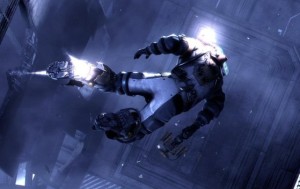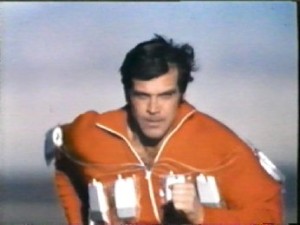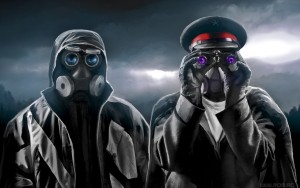 The little boy stayed up too late one night in front of the TV, transfixed by a movie about pod people – emotionless replicants taking over the planet. Humans could only escape detection by walking around, stiff and flat and drained of emotion. This terrified the boy, who’d always been one big ball of emotion – sensitive, they said. Thin-skinned. How could one survive a world stripped of feeling? Where the hint of emotion made you a target? Where someone you loved could be replaced by an alien hostile to love or tears? Every night for the next month, and for years afterward, he had nightmares about replicants coming for him.
The little boy stayed up too late one night in front of the TV, transfixed by a movie about pod people – emotionless replicants taking over the planet. Humans could only escape detection by walking around, stiff and flat and drained of emotion. This terrified the boy, who’d always been one big ball of emotion – sensitive, they said. Thin-skinned. How could one survive a world stripped of feeling? Where the hint of emotion made you a target? Where someone you loved could be replaced by an alien hostile to love or tears? Every night for the next month, and for years afterward, he had nightmares about replicants coming for him.
***
The man now leaves the train, his entire body shuddering from feelings he can neither name nor control, and the center he’s trying so hard to maintain breaks open as he drifts up San Jose Avenue, and noises come out of him, animal, primitive sounds of a very old pain.
In the safety of his house his dogs, alarmed by his noises, climb all over him, pushing him to the ground, where they lick the hot, stupid tears from his face.
* * *
The next night he and his husband drive to their regular 12-step meeting. The man sits hunched over in a metal folding chair in the back row, silent, a dull, brutish anger pulsing within him. It moves through him like a virus, infecting every organ, every nerve ending, every cell. The meeting is meant to keep him steady and sober and true, but he’s no longer there. He’s infected with a rage, and to protect his husband and the friends around them, he leaves his metal folding chair and tries to cool his flat, hot skin outside, in a courtyard, sitting in the dark on a bench.
He feels the full deep sickness of his family. He comes from sickness, and he sits, sick, in the church courtyard, scared of himself. He needs to throw a punch.
The man pulls out his phone and texts Hank the Blank.
I read your stories. Fathers and sons having sex?? Barbers?? Why the fuck would you think that I would want to read that shit? You are not human. You are the most selfish man I have ever known. You are sick. You will never be my father. We’re done. I am through keeping your secrets. I am through paying the price for your actions.
He hits “send,” and feels the rage within him dim, leaving him heavy and sad and cold on the bench. His husband finds him and together they drive home.
The next day on the train after work he reads the email his father has sent him:
1. I accept the fact that my stories are not your cup of tea, but they have been widely praised by thousands of readers in the past three years, including many well-educated, well-adjusted people whom I’ve come to know and admire, including other more experienced writers. Far less than 1% of the feedback I’ve gotten has been negative, and certainly none as vicious as yours. It was uncalled for.
2. They are fiction. In 12 stories there is only one instance of actual father-son sex, which I don’t endorse and which had nothing remotely to do with you. Even famous authors write about things they would never personally engage in (murder comes to mind as one obvious example).
3. Yes, some of my earlier stories lacked maturity and the best of taste, but there’s long been a noticeable shift to ones that now focus on adult relationships, feelings, and upbeat endings. Yes, there is sex, but sex is a normal human function.
4. I think you are a first-class hypocrite for complaining about my little web stories, for which I get no compensation and write only for adults who choose to come to that site. For years now you’ve been immersed in writing a non-fiction account about the foibles of the people who raised you and expecting someday to get money and adulation for it. Maybe it was cathartic for you to write it, but it’s hurtful to many of those you have written about, including your mother who isn’t even around to agree to it or defend herself from your less-than-gracious portrayal of her. And you have the nerve to call ME sick! If you’re such a great writer (and you are), why don’t you write a novel instead and leave your family out of it?
Your beef with me feels like something much bigger than my stories. Talk to your counselor about it, but keep the above points in your mind when you do, because there are always two sides to any story. Then I would ask that you take a few months to think it over before burning any bridges or inflicting unnecessary pain on anyone. I can take anything you throw at me, but I’m not taking sole responsibility for this. It takes two to make a relationship work, and I don’t think you’ve done your share.
Rage again possesses him. He flies off the train and up the hill, blowing through the front door like a bullet. His husband is there. The man calls Hank the Blank and puts him on speaker, because even now, with hundreds of miles between them, he fears his father, and right now, he fears himself even more.
And what comes out is a primal scream. He loses his mind. He screams the things the nine-year-old boy never could. He screams for every wasted year of his life, every twisted, balled-up feeling he shoved into every back corner of every internal organ.
The house rings with his screams. The dogs cower. He bawls, “Inward focused? Non-fiction? That was how I survived, you idiot. You made me that way. I’m your fucking Frankenstein.” The man is nine years old. He is 16. 28. He swings between demon and man.
“Stop screaming. You’re being irrational.”
“You’re a fucking psychopath.” The man has never, in his life, swore at his father.
“What do you want from me?” Hank says.
“I..I don’t…those stories…”
“They’re fiction. They’re fantasy.”
“THEY REALLY HAPPENED!”
“I wasn’t writing about you.”
“Are you fucking kidding me? A father and son naked in a fucking bathroom? You’re in so much fucking denial you don’t even know who the fuck you are!”
“I repeat, I wasn’t thinking about you…”
“I was your fucking son! You were supposed to fucking protect me!”
“…and the story about the barber – I wasn’t thinking about your husband -”
“Shut the fuck up!”
“I don’t know why you are so upset. The incident when you were nine years old. I didn’t plan it, it just happened. And it only took up an hour of your life.”
The man turns to his husband, who sits, crying quietly, on the couch beside him. “He doesn’t get it,” his husband says.
“What do you want from me?” Hank says.
“Nothing,” the man replies. “I don’t want anything from you.”
“Are you going to take this to a public forum?”
“Have a nice life,” the man says, then presses “End.” He sets his phone on the coffee table. Its screen is flecked with layers of dried spit. His clothes hang from him wetly. He’s hunched like a burned-out bulb.
“I’m so sorry,” his husband says.
***
Hank the Blank goes into damage control mode the next day, pulling his stories off the internet, and calling family members to corral their support. The man’s brother calls him that night. “I just talked to Hank. I’ve never told you this, but he did it to me, too.”
They talk long into the night.
***
The man searches and, after some trial and error, locates assistance. Once a week, after work, he sits on a couch in an office of a stranger, above Castro Street, staring at the Chagall print hanging on the opposite wall, and talks to this stranger. A figure in the Chagall floats near the top of the frame. Chagall liked floating figures.
The man tells the stranger that he feels like an astronaut. He tells him that his father, Hank the Blank, comes from another planet, and that the man feels at home neither here nor there. He’s floating, drifting, untethered, with a dwindling tank of air, hovering over a planet that talks about karaoke and Frappuccinos. He’s an alien.
The stranger calls the Minneapolis Police Department, and a detective there tells him that the statute of limitations has long passed, and there is nothing they can do about what happened to the man when he was nine years old.
The stranger asks the man if he believes that Hank is an immediate danger to anyone else. To other children?
“I don’t know,” the man says. “He’s a fucking replicant.”
After a few weeks the stranger has gained his trust.
I call him Ground Control.
I tell Ground Control that I don’t understand the things that are happening to me. I’m afraid all the time. I don’t trust anyone. I panic on BART. “I bought a knife,” I say. “For self-protection.”
“Your father is in Arizona.”
“I’m not scared of him,” I say. “But I ignored my gut and I trusted him, for the last ten years, and look what he did. If he could do that, what are strangers capable of?”
I’m terrified of Facebook, where psychopaths can more easily disguise themselves.
After work I return to the house I bought with Joe – I return to my haven. I close the bedroom door, shut the blinds, swallow my evening meds, and I lie in bed with the dogs breathing beside me. I watch Netflix streaming. I watch documentaries about soldiers coming home from Iraq. Soldiers hiding in their bedrooms with their guns cocked.
I am deeply fucked.
I find an online forum for men who endured childhoods like mine. I talk to other grown men whose lives have narrowed as they aged. Men who can no longer hold a job. Deeply fucked men. Some of them are all alone, in their houses, in their rooms. Talking, at least, to each other, typing on their keyboards and hitting “Send.”
Joe comes home and sees the closed blinds and says, “Bad day?”
I tell Joe that I know that I’m lucky to have him, that someday soon I hope to be a partner to him again.
In addition to the Ke$ha songs and the knife-wielding clowns filling my head, a courtroom trial runs there, and every day I flip between prosecution and defense, running down the list of evidence against my father, trying to determine if breaking off contact was the right thing. How will I feel when he’s on his death bed?
I don’t know why he wanted me to read those stories. Even if I wanted to ask him, I couldn’t trust his answer. I can’t trust that he knows even his clearest motives.
I think about fiction, and fantasy, and memoir, and how Hank and I’d hurt each other with our stories. Hank the Blank had feared my nonfiction, for good reason, and Hank’s fiction had been anything but, at least to me. I try to inch down the hall of mirrors, puzzling over fiction and nonfiction, but my head quickly grows weary and confused.
They have power, don’t they? Stories still have power.
The truth has a current, and I’ve spent eight years and nineteen drafts rowing upstream. I wrote a book that was lighter than the truth, wanting something madcap and funny, wanting to entertain with a story about a Modern Family full of same-sex love. I’d set out to write the truth, but I’d left out one crucial bit, to protect Hank, ending up with a book that I couldn’t, in good conscience, release into the world. I’d written the wrong book, and it had nearly killed me.
Eight years and nineteen drafts later, I give up. I throw my paddle into the water and let this boat drift with the current.
Fuck it, I say. I’ll write a book about a deeply fucked family – to give comfort to the deeply fucked reader.
 Spent the morning plugged into a treadmill at Kaiser in an effort to find out why I haven’t been breathing like my old self. Electrodes and wires dangling everywhere. Have they made bionic lungs yet? Are they covered? Will people make fun of my now-patchy chest hair?
Spent the morning plugged into a treadmill at Kaiser in an effort to find out why I haven’t been breathing like my old self. Electrodes and wires dangling everywhere. Have they made bionic lungs yet? Are they covered? Will people make fun of my now-patchy chest hair?



